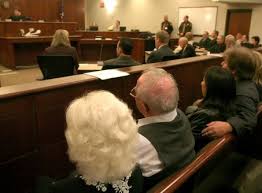The Emotional Safety of a Collaborative Divorce

In reading an article in this morning’s newspaper, I found a quote that sets out one very good reason why the Collaborative Divorce Process is better for most families than litigation. Litigation is what a trial is called, either before a judge or before a jury, and the rules of the game in litigation are to present evidence as to why the other side is SO BAD that you should “win.” Keep in mind that winning in litigation may also mean that you and your spouse never speak again and that your children will be a part of the life-long conflict between you and your spouse that the trial has just cemented. Litigation can end the current case, but it rarely resolves the conflict. No one envisions emotional safety when they imagine going to court, and no one experiences emotional safety when they go to court. Some cases and some clients are so high conflict that going to court is the only option, but for the vast majority of cases, there is a process that can give you and your family that emotional safety and a much better chance of saving you from lifelong conflict—that process is called Collaborative Divorce.
The quote I read this morning was from retired minister, The Reverend Christy Thomas, who has a column in our local newspaper. She said, (regarding parents and children, and I paraphrase to demonstrate its applicability to divorce), that dialogue is shut down at a time when dialogue is the one thing that is most needed. She says we should, “Consider [for] a moment the nature of true dialogue, the process of listening to one another without judgment, argument or seeking to change the mind of the other. True dialogue opens a door to a safe room. In the safe room, people…can begin to talk through their lives, decisions, and repercussions. However, the moment that the other party moves from generous listening to offering advice [or in the case of divorce, becoming judgmental or defensive], the safe room turns dangerous [emotionally]. All defenses spring to life. Rational thought hides while the fight-or-flight gut reaction takes over.” Anyone who has ever gone through a divorce will tell you that they feel in constant fight-or-flight mode—their life is in crisis and they feel like they can hardly breathe at times. Litigation makes the situation even worse–clients in litigation say that they experience that fight-or-flight mode that runs adrenaline up and returns us to our primal state of fighting for survival. Nothing about that description sounds like it gives anyone the feeling of safety. And NOTHING about that level of emotion lends itself to good decision-making, decisions that will affect the rest of your life.
While divorce is always a tragedy, if it becomes necessary, Collaborative Divorce provides clients that emotionally safe space the minister described above. Collaborative Divorce professionals are trained in techniques that enable divorcing clients to have that true dialogue, to talk through their situations, their options and the consequences of each of those options, with sound reasoning, compassion, respect and a much calmer environment than the courtroom. The Collaborative Divorce process is a very structured process. It has what is called a Roadmap, which set out the steps of information gathering, option generating and option evaluation, and agreed resolution. With the Roadmap, just as in a road trip, clients are able to know, at any given time, where they are in the process. This gives Collaborative clients a more secure footing and the feeling of having much more in control over the outcome of their case. In a Collaborative Divorce, clients are able, with the support of their trained Collaborative Divorce team, to reach an agreed resolution of their case, while preserving their privacy, their relationships and their estate. If you or someone you know is considering divorce, consider Collaborative Divorce with a TRAINED AND EXPERIENCED COLLABORATIVE LAWYER. If I can be of help to provide you or someone you know about this process, please contact me at 940-383-2674, camille@milner-law.com or review my website, www.milner-law.com, for more information.













